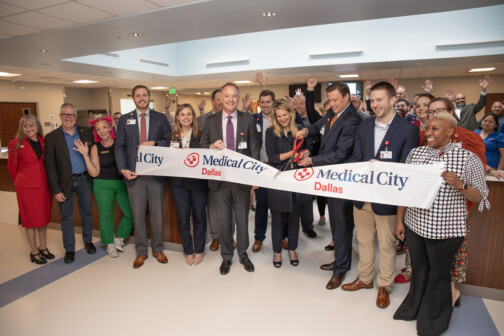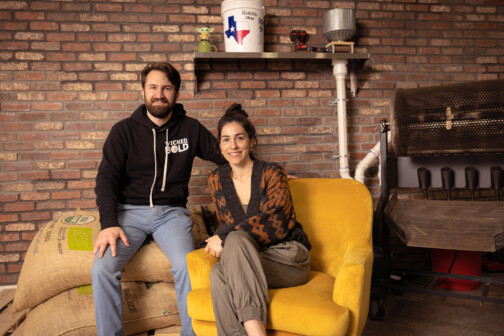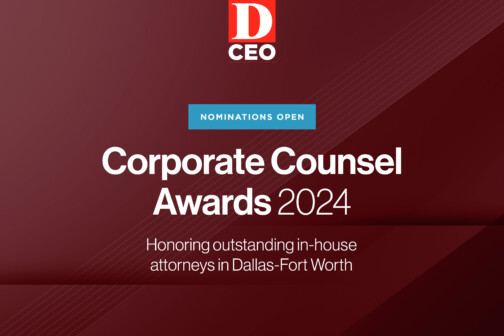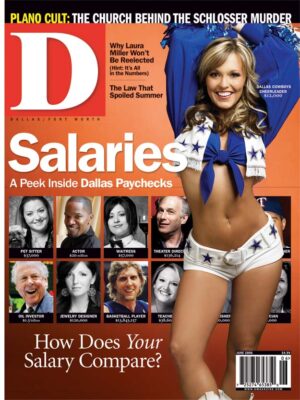You think sharks can smell blood? Check out the politicos slicing through the waters around City Hall. In 11 months, Dallas will elect a new mayor, and already the candidates (so far, all great whites) are moving in for the kill. It’s still early to tell who will bite off the biggest chunk, but not from whose hide it will come: the incumbent-former Oak Cliff gadfly turned Preston Hollow swell, Her Honor, She of the Pearl Necklaces and Pinstriped Pant Suits, Laura Miller.
The coed in the opening minutes of Jaws had a better chance of reaching shore.
The mayor’s political floundering is almost painful to observe: 1) She had a major falling out with the Dallas business community when she picked a bizarrely gratuitous fight with Ray Hunt over tax abatement. 2) She has strong pending opposition in the North Dallas districts that helped elect her.
And 3) black people hate her.
Their words. Used often. Now with added weight.
For the first time since the 1991 federal court decision that gave us the 14-1 council system, the four predominantly African-American districts in the southern half of the city will hit term limits in the same election. That means no black incumbents. Goodbye to Don Hill, Leo Chaney Jr., James Fantroy, and Maxine Thornton-Reese.
No black incumbents means heavy politicking and campaign spending in South Dallas and the southern sector. Which means higher-than-usual voter turnout. If the past is prologue, those votes won’t be cast for the woman who has clashed with black interests so often in her political career that even Calatrava couldn’t build a bridge of reconciliation.
“I don’t know if Laura Miller can be beaten,” Fantroy says, “but I do believe that with Laura Miller on the ballot, there will be a big turnout.” He says the minority community “under no circumstances-under no circumstances” can tolerate her another four years.
Add to that the deep fractures in Miller’s North Dallas voter base, and the loss of support from Lake Highlands and East Dallas, and there’s only one hard-nose conclusion.
She’s gone.
So who’s next? Squelch any fantasies of The Return of Ron Kirk, who is doing fine at Vinson & Elkins, thank you, and isn’t running. Or Commissioner John Wiley Price, whose entry would be unbelievable fun, but that ain’t happening, either. Supreme Court nominee Harriet Miers’ name has popped up, but that notion hardly seems worth the effort it took to write this sentence.
Half of the City Council, including Don Hill, has been floating trial balloons, easily popped. But only a few people, so far, have declared an intention to run against Miller or have taken the preliminary step of designating a campaign treasurer. Of that group, Zac Crain is the easiest to dismiss. He’s a 32-year-old associate editor at the in-flight magazine American Way who once worked alongside Miller at the Dallas Observer before she decamped for City Hall.
More substantial candidates are District 9 Councilmember Gary Griffith, and Texas Instruments public affairs VP and much-credentialed civic betterment leader Phil Ritter. Certainly Max Wells is to be reckoned with. The banker and former North Dallas councilmember says he was approached last October by supporters saying, “Max, you have to run for mayor. We have to change City Hall.”
For now, put your money (and it will take at least $2 million to win the race) on Darrell Jordan, the lawyer and Fair Park advocate who lost to Kirk in a free-for-all race in 1995. The most well-known of the declared all-Anglo contenders, Jordan says he started thinking seriously about running late last year, but that a deeper seed may have been planted earlier when Dallas booted the quest to get the Cowboys to relocate to Fair Park and Arlington swooped in for the Hail Mary.
“That would have been the ticket for Dallas to signal once again that it was open and ready for business,” Jordan says. “But we just flat blew it.”
This grew, and finally the silver-haired lawyer, formerly of Hughes and Luce and now Godwin, Pappas, Langley and Ronquillo, told his wife he wanted to run. “But I promised I would not get involved in another election campaign unless I knew in my heart I could win.
“I don’t think it’s surprising that she’s in serious trouble,” Jordan says of Miller. “Her negatives far outweigh her positives.” An early poll showed Miller’s citywide voter support level had dropped below 40 percent.
But polls don’t win elections, and Jordan, taking a hiatus from full-time law practice, isn’t wasting any time between now and May 12. A recent weekday found him campaigning at a barber shop in South Dallas, lunching with former Oak Cliff councilmember Bob Stimson, and speaking to an evening meeting at the Tower Club downtown.
Like the other candidates, Jordan knows that victory depends on the C-word: coalitions, the new Iron Law of winning citywide in this majority-minority city. Essentially, say insiders, the winner must dominate southern Dallas by 80 percent or more, carry a majority of the Hispanic vote, and take at least 30 percent of the Anglo vote.
Jordan thinks he has the edge with support and rapport in Hispanic and black communities, with whom he has worked over the years on Fair Park and other issues. He also figures he has strength in North Dallas and from the business community.
Max Wells, who also enjoys at least some name recognition based on his years on the City Council, thinks he can put that together, too. He says he has already lined up some major players in minority communities.
Phil Ritter, who has a degree in urban planning, also hopes to pick up the support of the business community that Miller has largely alienated. As for the Iron Law, he’s all over it. “My passion is building coalitions,” he says.
Second-termer Gary Griffith hopes to overcome his admitted lack of name recognition by using his early announcement to blanket the city and “get to know the people.” Noting that he has been underestimated throughout his political career, Griffith already has fielded “issue polls” to tell him what the voters want to hear about-education, security, economy.
But the wildest of the wild cards for 2007 is yet be played: the Hispanic vote. Although Latinos make up 42 percent of the city’s population, compared to 30 percent Anglo and 23.5 percent black (based on 2004 U.S. Census data), they suffer from low turnout, seriously underweighting potential political clout. Maybe that’s why the mayor thought she could risk being a no-show at the massive April 9 immigration rally, choosing instead to go grocery shopping at Whole Foods.
According to data compiled by political analyst Dr. Dan Weiser, the percentage of registered Hispanic voters in Dallas who cast ballots hovers at around 10 percent, as was the case in the strong-mayor elections of May and November 2005. In those elections, by comparison, black turnout was 23 and 16 percent, respectively; Anglo turnout 22 and 24 percent.
If a strong Hispanic candidate enters the race, it could bring in a surge of Latino voters and change all bets. But that won’t happen in 2007. In 2011, though, Dallas will have a Latino mayor, and his name probably will be Rafael AnchÃa, a much-respected state representative and former national LULAC Man of the Year, who’s being groomed for bigger things.
Miller has until March 12, the official filing deadline, to weigh her chances and study her polls. Some say her ego won’t let her back down. Others say she’ll pull an LBJ. (The mayor did not return repeated calls for comment on this story.)
Griffith says the crunch on the election will come next March or April, when voter attention becomes more focused, “like the last two minutes of an NBA basketball game.” But this is a year in which both the long and short game count.
“Let’s face it,” Jordan says of the mayor, “she’s resilient and good on her feet, and things could change.” Wells isn’t looking for a shoo-in, either: “I don’t ever underestimate the mayor,” he says.
For better or worse, it’s the estimation of the voters that finally will matter. Which is where we have do a little more math.
Turnout in recent mayoral elections has gone like this: 23.8 percent in 1995, for Kirk’s first term, 6.7 percent in 1999 for his second; 21.5 percent in 2002, for Miller’s mid-term race to replace Kirk, 16.6 percent in 2003 for her first full term; 20 percent in May 2005 for the first strong-mayor election, 18.9 percent for the second.
For next year, let’s get drunk on optimism and forecast a whopping turnout of 25 percent of the 590,000 registered voters (out of 858,310 eligible) showing up at the polling booths. That works out to 147,500 ballots cast.
Half of them-73,750 warm bodies in a city of 1.2 million, 6.1 percent of the population-will decide who shows Miller the door. The vanguard will be African-American, reinforced by Latinos, slammed home by disaffected Anglos. City Hall will never be the same.
Get our weekly recap
Brings new meaning to the phrase Sunday Funday. No spam, ever.
Related Articles

News
Medical City Opens ER in Garland and Local Dermatologist Named Youngest Ever President of the American Academy of Dermatology
Plus Health Wildcatters wins accelerator competition and DFW Hospital Council Foundation awards.
By Bridget Reis

Business
Wicked Bold Chocolate CEO and Comedian Deric Cahill on Why it Pays to Be Funny
The brand leans into humor, but the business' success is no laughing matter, with products in nearly 2,000 retail locations nationwide.
By Will Maddox

D CEO Award Programs
Nominations Open: D CEO’s 2024 Corporate Counsel Awards
The annual program honors top in-house attorneys in Dallas-Fort Worth, from outstanding up-and-comer to outstanding general counsel.


